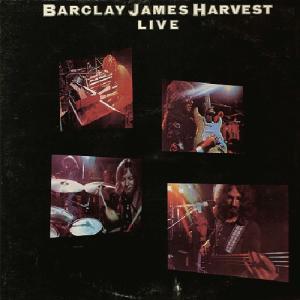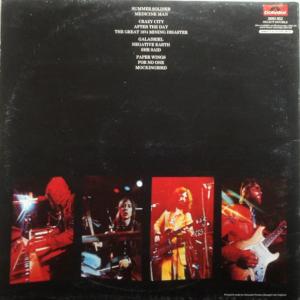Live


Artist:
Barclay James Harvest
Label:
Polydor
Catalog#:
2683 052
Format:
Vinyl
Country:
United Kingdom
Released:
1974
| Tracklist | |||
| A1 | Summer Soldier | 10:17 | |
| A2 | Medicine Man | 10:26 | |
| B1 | Crazy City | 4:59 | |
| B2 | After The Day | 7:28 | |
| B3 | The Great 1974 Mining Desaster | 6:30 | |
| C1 | Galadriel | 3:18 | |
| C2 | Negative Earth | 6:20 | |
| C3 | She Said | 8:34 | |
| D1 | Paper Wings | 4:19 | |
| D2 | For No One | 5:53 | |
| D3 | Mockingbird | 7:37 | |
Credits
Bass Guitar, Guitar [Rhythm], Vocals – Les Holroyd
Drums – Mel Pritchard
Engineer – Brian Humphries
Guitar [Lead], Other [Recorder], Vocals – John Lees
Mellotron, Electric Piano, Synthesizer [Moog], Vocals – Stuart 'Wooly' Wolstenholme*
Other [Stage Equipment] – Charlie, Ian Southerington
Producer – Rodger Bain
Written-By – John Lees (tracks: 1, 2, 4 to 6, 10, 11), Les Holroyd (tracks: 3, 7 to 9), Mel Pritchard (tracks: 7, 9)
Notes
Recorded live at the Theatre Royal Drury Lane, London and the Stadium, Liverpool, with the Island Mobile Studio
Mixed at Island Studios, London
Strawberry Bricks Entry:
After a change in both management and record label, Barclay James Harvest released Everyone Is Everybody Else in June; though the band wasn’t thrilled with Rodger Bain’s production, the public was-both Radio Caroline and the BBC picked up on the album. Two dates from the subsequent tour were recorded for their next release, the double-album Live, with the Drury Lane performance also captured on film. The symphonic structures of “Summer Soldier” open the album, followed by the majestic Mellotron of “Medicine Man.” It’s a mighty one-two punch: a powerful live band, BJH are at their best here. Under the solid foundation of bassist Les Holroyd and drummer Mel Pritchard, John Lees’s gritty guitar helps elevate the rock quotient of their music. “Crazy City” highlights the band’s vocal harmonies, while “After the Day” lets more of Wooly Wolstenholme’s big chords shine. The album contains a selection of cuts from their Polydor debut, but also provides a cap on their previous Harvest-era repertoire, including Lees’s winsome “Galadriel” and Holroyd’s dramatic “She Said.” Fittingly, the album ends with the fan favorite “Mockingbird.” Ever slow-building, the track first highlights the band’s softer, more melodic nature before they lock groove for the hard-driving symphonic finale. BJH never sounded better on record. The album reached No. 40 in the UK charts, finally opening the floodgates for the band. Their next three albums would all chart in the UK, and see release in the US and Europe, affording the band the opportunity to tour worldwide. Wolstenholme would depart the band in 1979, releasing a solo album, Mæstoso, the following year. BJH continued to endure fashion and fate over the next decade with their unique brand of staid, forthright music, eventually finding a substantial audience in Germany.

